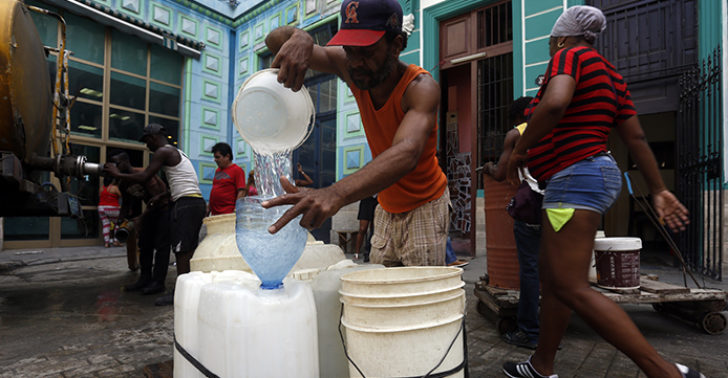
This drought of ours
HAVANA — Six o’clock in the evening in the multi-family dwelling. The background sounds, always so diverse, become more recognizable and homogeneous when the water pump is activated.
While someone tunes the special concert of classical music or the popular guaracha on Cuban TV, another show — free of charge and without press coverage — begins when the neighbors collect their water.
When, some weeks ago, the supply of water to the population was affected (more than usual) because of broken pipes, the collective efforts in buildings and communities became more intense.
It was not the usual cackling — “the water is on,” “turn on the pump,” “fill these containers, son,” “stretch the hose,” etc. We could hear hundreds of voices as in a giant and collective choir, voicing the pent-up need, now amplified. We know that without water we can’t live.
On the TV newscast, the announcer said that the maintenance of the broken pipes was contemplated in the action plan of the National Water Institute. Then he said that the pipes had been in use for 60 years.
A colleague then commented — in jest — that the problem was that the maintenance had been programmed to commemorate the first century of use.
The acute drought afflicting the island and its population is not news. But perhaps the real dimension of the problem has not been explained publicly to make people aware of the gravity. The humblest, the most dispossessed Cubans already know that.
Those farmers who see their animals get sick or die, those who see that the plantations don’t grow or produce even 50 percent of the hoped-for harvest know it. The people who have spent years paying the drivers of the water trucks “under the table” to fill their private tanks know it, too.
So do the water-cart operators in the most remote areas, who cover long distances with their mules and containers, filled at some well for sale to those who can’t travel. And those who (at least in Havana) buy filtered water for 15 pesos per gallon.
And those who live in Central Havana (where 2 out of every 100 buildings collapse every day) know that after filling the rooftop tanks, some of the water seeps out of the century-old pipes, drips through the ceilings and walls and is collected by the tenants in pots and pans, drop by drop. All those people know it well.
Those who seem not to know it or suffer it are those who waste the water. The tourists who stop to take pictures of the local folks carrying cans of water on their way home after work will have enough water in their hotels, even though a watermain break has affected almost the entire population of Havana. Those who stay at an apartment or room rented through Airbnb will be blissfully unaware.
Those who leave the faucets running while they wash a couple of dishes, or those who can take interminable showers during this abominable heat wave, or those who pollute the rivers, allowing their factories to pour waste in them and contaminating our phreatic zones, those — it seems — don’t know it, either.
The fact is that, according to the National Office of Statistics (ONEI), whose latest figures go back to 2015, the situation becomes worse with every passing year.
“At the closing of 2015, 1,764 million cubic meters could not be delivered because of unavailable surface sources,” says ONEI in one of its charts.

The ONEI also publishes data on the population with and without access to drinking water, but only between 2009 and 2014. The number of people who have no access to this resource rose during those three years from 5.5 to 7.7 percent in 2011 and then dropped to 4.8 percent.
This means that in 2014 there were 539,472 people without access to drinking water in Cuba. And if the situation has worsened, as shown by press reports, that number should be a lot larger in 2017.
The residents of one of the multi-family buildings in Central Havana — all so cooperative when the water comes in — don’t know much about these figures. They also don’t need so many details because they are the details in their own situations. Many of the possible solutions for this problem are way out of the hands of these people. It is the government, both local and national, that should take the reins.
For now, the ability to protect and save the water is in our hands, so that — albeit in a small scale — we can better distribute what little we have. In one way or another, the drought in Cuba affects us all.
But, as in everywhere else in this world, some are affected a lot more than others, and almost always they’re a majority.
Progreso Weekly authorizes the total or partial reproduction of the articles by our journalists, so long as the original source and author are identified.

